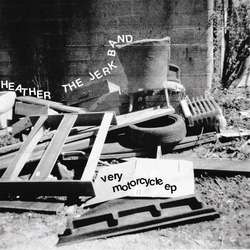2008 was the year where journalists pushed and shoved each other to be the first to frantically lavish praise upon a rapper with the voice of a frog, underwhelming beats, and the lyrical talent of a self-obsessed sixth grader. Tha Carter III has made everyone temporarily insane, and it's going to be fun in about five years watching everyone listen to "A Milli," slap themselves in the face, and wonder what the hell they were thinking. All the while, Mike Skinner will still be in his own hectic world, where he calls himself The Streets and continues to craft daring, original hip-hop, totally independent of whatever the journalists are drooling over.
Everything is Borrowed is The Streets' fourth full-length and it comes after a string of three albums that, journalist-bashing aside, have been rightly well-received. Anytime Skinner gets back in the studio to cut a new one he will have lots of eyes over him, eagerly anticipating what he's going to do next. But he never seems to give in to any hype or expectations, instead going forth with his vision of hip-hop and letting his ideas take him to new areas of genius. Skinner's method of rapping is most easily compared to a British guy merely talking with you, conversing about the things that are most prevalent on his mind right that second. You'll never hear him yelling, screaming, or making unintelligible noises. Maybe the occasional "Oi," but British guys can't help that. It's in their blue blood.
As Mike Skinner has gotten older and gotten a better handle on his "garage" brand of hip-hop, he has become at ease with melody, making sure every song has a super-catchy chorus either sung by a collaborator, or quite handily by himself. "Heaven for the Weather" takes on a gospel vibe, with an upbeat piano-driven refrain that absolutely must be sung along with. A number of shifts in musical direction occur on Everything is Borrowed, as Skinner smoothly goes from the sinister swing of "I Love You More (Than You Like Me)" to the dirty guitar skronking in "The Way of the Dodo" to the pensive strings in "On the Flip of a Coin" and then a stirringly soulful piano/strings combo bringing to life a true gem in "On the Edge of a Cliff." He particularly lets his guard down for the lullabyish "The Strongest Person I Know," a song with soft acoustic guitar, lilting piano, and no percussion at all. By no means is Skinner a perfect vocalist, but any missed notes are more endearing rather than grating.
After listening to The Streets for such a long time, it might be hard to consider other people's opinions of it, especially of Skinner's voice and delivery. You can either take it or leave it, because Skinner is never going to change. His lyrics, though, are as effortlessly brilliant as they've ever been. In the title track, he tosses off this line, "Just when I discover the meaning of life, they change it." An entire essay could be written about that line alone, and yet it's not even repeated anywhere else. Few rappers possess the awareness to have no self-awareness in the first place. Skinner probably doesn't even know how to posture and preen and tell you about how great he is. He might not even believe that. Instead, he'd rather explain to you what he thinks and why he thinks it, as he does in the venom-free religion putdown of "Alleged Legends." Skinner also puts down himself, as he describes to his unrequited love how he spent all morning drawing a picture of her and realized something: "It was absolutely shit, I'm awful at drawing."
The day will probably never come for The Streets to turn into an international superstar. As long as the critics and the public continue to go nuts over insipid singles like "Lollipop" and buy millions of copies of albums that have songs like "Pussy Monster" on them, Mike Skinner's luck isn't going to change anytime soon. But he is clearly unfazed by such adversity, and appears to be a man who makes music for his own enjoyment that just happens to be enjoyed by a bunch of other people as well. That's probably more than enough for him.






